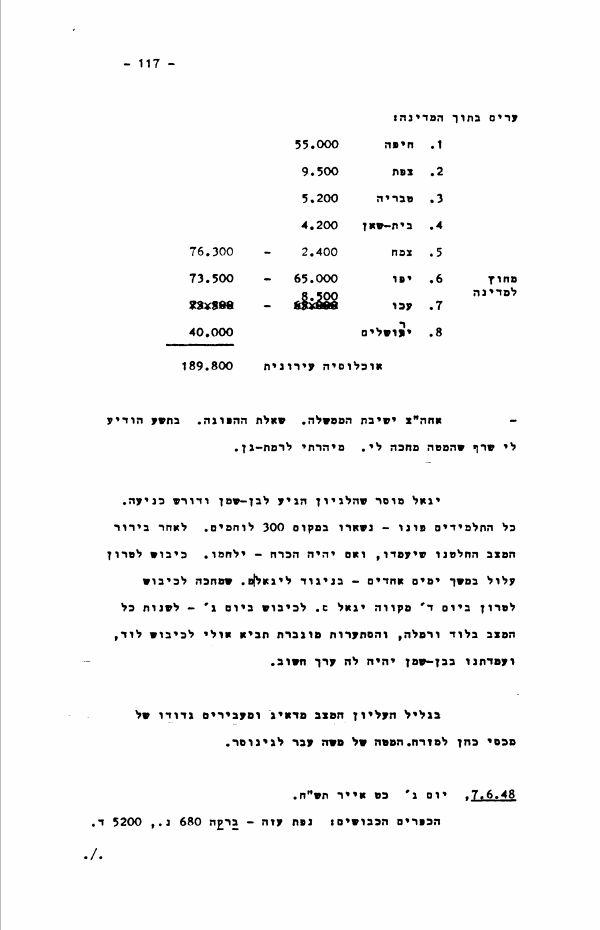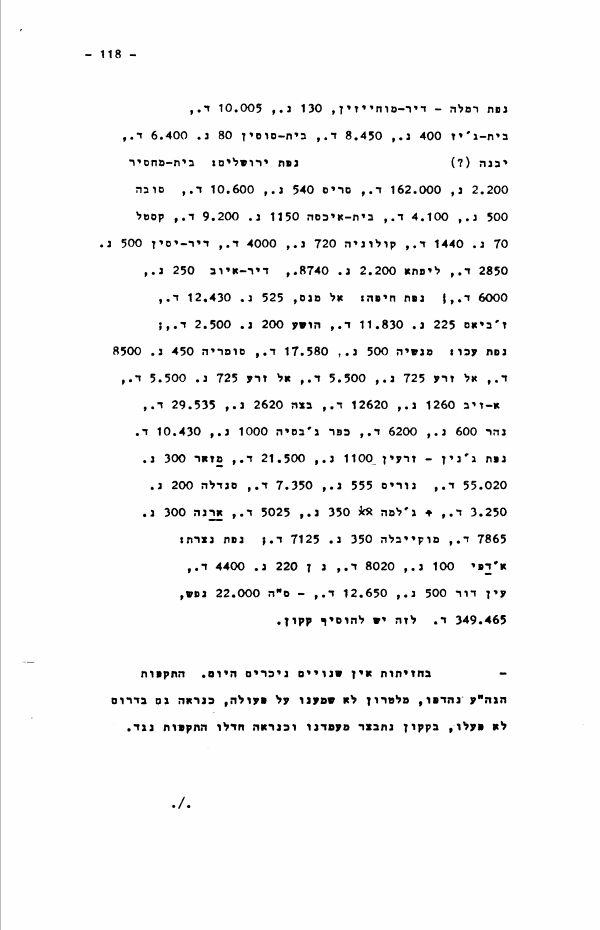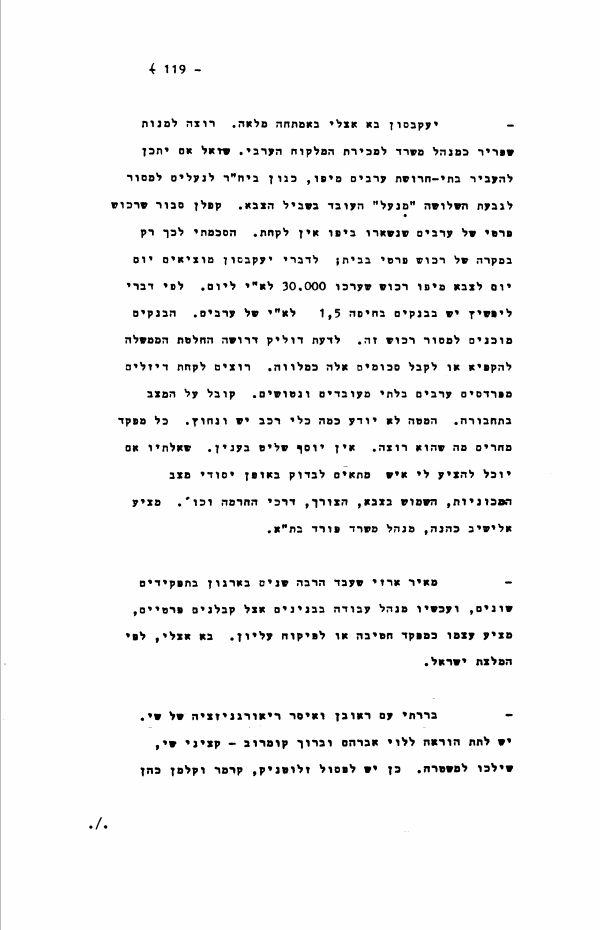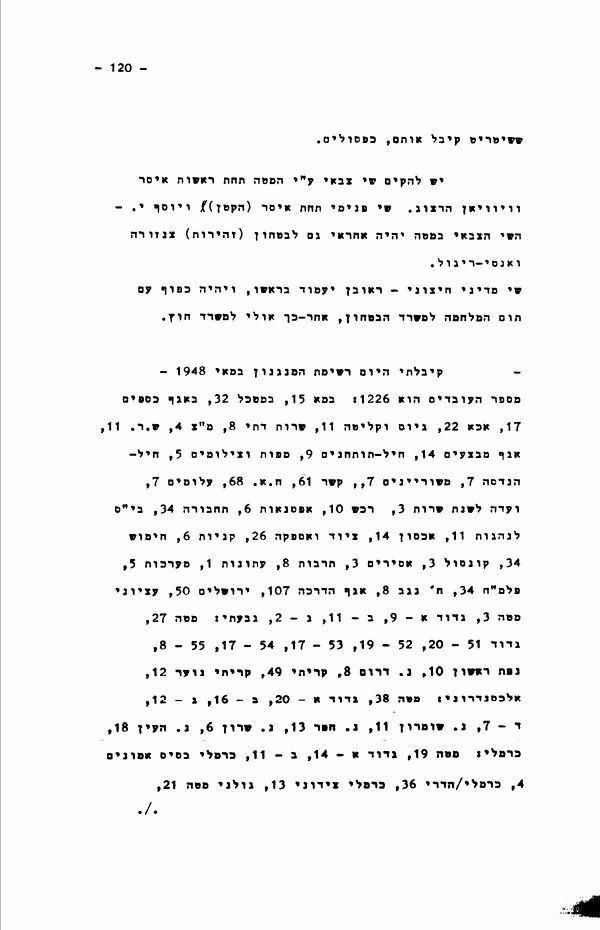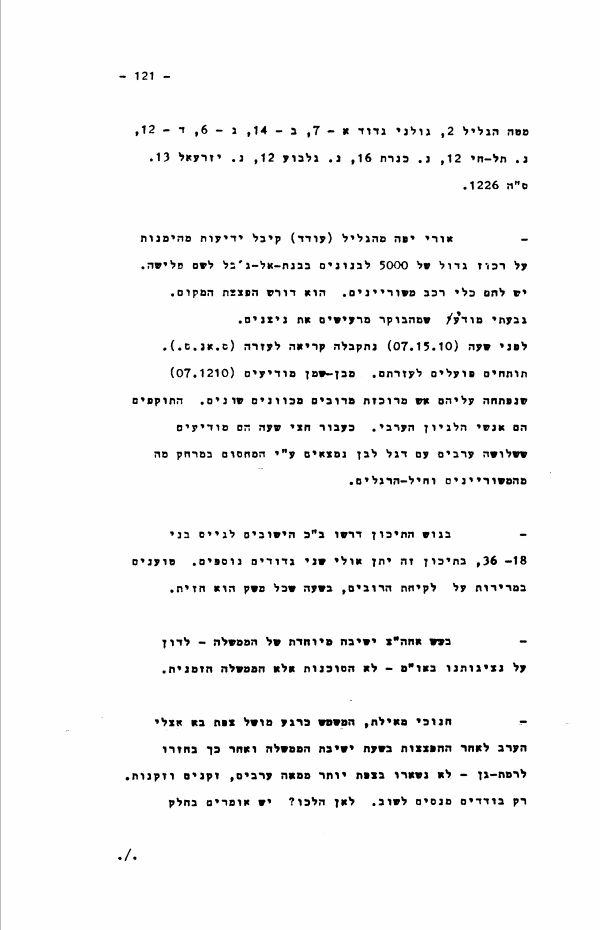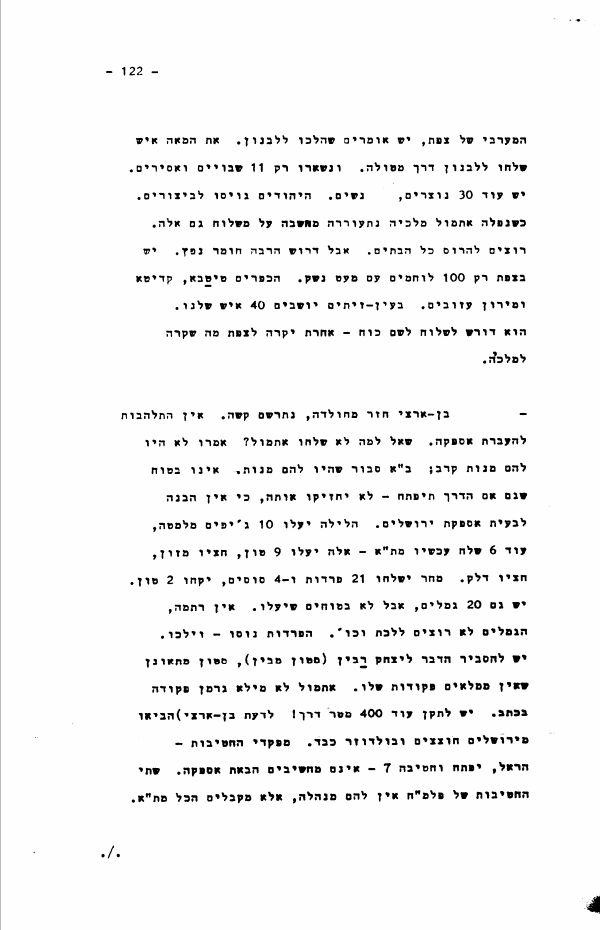Tuesday, June 7, 1948
The conquered [and evacuated] villages:
Gaza Subdistrict - Barqa [south of Gan Yavne] 680 p. [persons], 5,200 d. [dunam].
Ramle Subdistrict - Deir Muheizin [west of Nahshon] 130 p., 10,005 dunam. Beit Jiz [Harel] 400 p., 8,450 d., Beit Susin [Ta'oz] 80 p., 6,400 d. Yavne (?).
Jerusalem Subdistrict: Beit Mahsir [Bet Meir] 2,200 p., 16,200 d., Saris [Sho'eva] 540 p., 10,600 d., Suba [Tsova] 500 p., 4,100 d., Beit Iksa 1,150 p., 9,200 d., Kastel 70 p., 1,440 d., Qolonia [Mevasseret Yerushalayim] 720 p., 4,000 d., Deir Yassin [near Giv'at Shaul] 500 p., 2,850 d., Lifta [Mei Neftoah] 2,200 p., 8,740 d., Deir Ayyub [northwest of Sha'ar HaGai] 250 p., 6,000 d.
Haifa Subdistrict: Al-Mansi [Midrakh Oz] 525 p., 12,430 d., Ghubayya [southeast of Mishmar HaEmek] 225 p., 11,830 d., Husha [east of Ramat Yohanan] 200 p., 2,500 d.
Acre subdistrict: Manshiyya [northeast of Acre] 500 p., 17,580 d., Sumayriyya [north of Lohamei HaGeta'ot] 450 p., 8,500 d., Al-Mazra'a 725 p., 5,500 d., A-Zib [Achziv] 1,260 p., 12,620 d., Bassa [Betzet] 2,620 p., 29,535 d., Nahr [south of Kabri] 600 p., 6,200 d., Kafr Ghabisiyya [south of Kabri] 1,000 p., 10,430 d.
Jenin Subdistrict: Zar'in [Yizre'el] 1,100 p., 21,500 d., Mazar [on Mount Gilboa, south of Nurit] 300 p., 55,020 d. [apparently a mistake; should be 5,020 dunam], Nuris [Nurit] 555 p., 7,350 d., Sandala 200 p., 3,250 d., Jalamah 350 p., 5,025 d., Arranah 300 p., 7,865 d., Muqeibla 350 p., 7,125 d.
Nazareth Subdistrict: E-Dahi 100 p., 8,020 d., Nein 220 p., 4,400 d., ''Ein Dur 500 p., 12,650 d.
In total 22,000 persons, 349,465 d. To this we should add Qaqun [Yikon, northwest of Tulkarm].
No significant changes at the fronts today. Attacks [in the Upper Galilee] were repulsed. We didn't hear from Latrun regarding an action; apparently they didn't take action in the south either. In Qaqun we fortified our position and apparently the counterattacks stopped.
[Yosef] Yaakovson came to see me with a full portfolio. He wants to appoint [Dov] Shafrir as manager of the office for the sale of seized Arab properties. He asks whether it's possible to transfer Arab factories from Jaffa, for example to turn over the shoe factory to [Kibbutz] Giv'at HaShlosha, for [the factory] Min'al, which works for the army. [Eliezer] Kaplan believes that the private property of Arabs who remained in Jaffa should not be taken [expropriated]. I agreed [to refrain from expropriation] only in the case of private property in homes.
According to Yaakovson, property valued at P£ 30,000 is being removed from Jaffa for the army on a daily basis. According to [Naftali] Lifschitz, the banks in Haifa are holding P£ 1.5 million in Arab funds. The banks are prepared to turn this property over. In Dolik [David Horowitz]'s view, the government needs to decide whether to freeze these funds or receive them as a loan. They want to take diesels [pumps] from untended and abandoned Arab orchards.
He has complaints about the transport situation. The Staff doesn't know how many vehicles there are or are needed. Every commander appropriates whatever he needs. Yosef [Avidar] is not in control of the situation. I asked whether he could propose someone suitable to thoroughly assess the situation regarding vehicles, [their] use in the army, the need, methods of confiscation, etc. He suggests Eliashiv Kahane [sp.], manager of the Ford office in Tel Aviv.
- Meir Arazi, who worked for many years in the organization [the Haganah] in various roles and now manages the work at building sites for private contractors, proposes himself as a brigade commander or senior supervisor. He came to me at the recommendation of Yisrael [Galili].
I consulted with Reuven [Shiloah] and Isser [Be'eri] regarding the reorganization of SHAI [the Haganah's intelligence service]. Instructions should be issued to Levi Avrahami [sp.] and Baruch Komarov [Baruch] - SHAI officers - to go to [join] the police. [We] also need to dismiss as unqualified [the Mandate-era officers] Zolotnik [sp.], Kramer [sp.], and Kalman Cohen, whom [Police Minister Bechor] Sheetrit accepted.
Need to establish: A military intelligence service alongside the Staff, headed by Isser [Be'eri] and Vivian [Chaim] Herzog.
An internal intelligence service under (Little) Isser [Harel] and Yosef. Y. [Yizraeli]. The military intelligence service at the Staff will also be responsible for security (caution), censorship, and counter-espionage.
External state intelligence service - Reuven [Shiloah] will head this, and will be subordinate to the Defense Ministry until the war ends, afterwards maybe to the Foreign Ministry.
- Today I received a list of the apparatus [personnel] for May 1948 - the number of employees is 1,226: National Headquarters 15, General Staff 32, Finance Department 17, Personnel Department 22, recruitment and processing 11 , religious service 8, Military Police 4, M. S. [medical service] 11, Operations Department 14, artillery corps 9, mapping and imagery 5, engineering corps 7, armored corps 7, signal 61, air force 68, Gadna 7, service year committee 3, procurement 10, logistics 6, transport 34, driving school 11, storage 14, equipment and supplies 26, purchases 6, armaments 34, consul 3, detainees 3, culture 8, press 1, Maarachot [IDF magazine] 5, Palmach 34, Negev Brigade 8, Training Department 107, Jerusalem 50, Etsiyyoni staff 3, Battalion Aleph - 9, Bet - 11, Gimmel - 2, Givati: staff 27, Battalion 51 - 20, 52 - 19, 53 - 17, 54 - 17, 55 - 8, Rishon [LeZion] Subdistrict 10, Southern Subdistrict 8, Kiriati 49, Kiriati youth 12, Alexandroni: staff 38, Battalion Aleph - 20, Bet - 16, Gimmel - 12, Dalet - 7, Samaria Subdistrict - 11, Hefer Subdistrict 13, Sharon Subdistrict 6, Ha'Ayin Subdistrict 18, Carmeli: staff 19, Battalion Aleph - 14, Bet - 11, Carmeli training base 4, Carmeli/Hadari 36, Carmeli Sidoni 13, Golani staff 21, Galilee staff 2, Golani Battalion Aleph - 7, Bet - 14, Gimmel - 6, Dalet - 12, Tel Hai Subdistrict 12, Kinneret Subdistrict 16, Gilboa Subdistrict 12, Yizre'el Subdistrict 13. In total 1,226.
- Uri Yaffe [sp.] from the Galilee (Oded [Brigade commander]) received credible information about a large concentration of 5,000 Lebanese assembled in Bint al-Jbeil in order to invade. They have armored vehicles. He's calling for the place to be bombed.
Givati reports that Nitzanim is being shelled since morning. An hour ago (07.1510) a call for help (S.O.S.) was received. Cannons are being used to aid them.
Reports from Ben-Shemen (07.1210) say that they're coming under concentrated gunfire from different directions. The attackers are Arab Legion men. Half an hour later they reported that three Arabs with a white flag [signaling negotiations] have appeared near the barricade some distance from the armored vehicles and infantry.
In the central bloc representatives called for recruitment of 36-38 year-olds [garrison force]. In the center this would possibly provide two additional battalions. They're arguing bitterly against the confiscation of rifles, at a time when every farm is a front.
- Special government meeting at 6 p.m. to discuss our representation at the UN - [henceforth Israel will be represented] not by the [Jewish] Agency but by the Provisional Government.
Avraham Hanochi [sp.] from Ayelet [HaShahar], currently serving as governor of Safed, visited me this evening after the bombings [in Tel Aviv], during the government meeting and later after I returned to Ramat Gan: [After the fighting] in Safed there remain no more than 100 Arabs, old men and women. Only a few are trying to return. Where did they go? Some say to the western portion of the Safed [subdistrict]. Some say they went to Lebanon. The 100 people were sent to Lebanon by way of Metulla, and there remain only 11 prisoners and detainees. There are an additional 30 Christians, mostly women. The Jews were conscripted for fortifications. When Malkiyya fell yesterday, there was some thought of sending [forces, presumably] there too. They want to destroy all the [Arab] houses, but this requires a lot of explosives. In Safed there are only 100 fighters with few weapons. The villages of Taytaba [north of ''Ein Zeitim, near Dalton today], Qaddita [northwest of ''Ein Zeitim], and Meiron - are abandoned. In ''Ein Zeitim there are 40 of our men. He's demanding that a force be sent there - otherwise what happened in Malkiyya will also happen in Safed.
- Ben-Artzi returned from Hulda. His impression is of a tough [situation]. There's no enthusiasm for transporting supplies [to Jerusalem]. He asked why they hadn't sent [a convoy] yesterday. They said: They didn't have battle rations; Ben-Artzi is convinced that they did have rations. He's also not sure whether - if the road [the "Burma Road"] were opened - they would maintain it, because they don't understand the problem of supplies for Jerusalem.
Tonight 10 jeeps will drive up. He just sent another 6 from Tel Aviv - these will carry 9 tons, half food, half fuel. Tomorrow 21 mules and 4 horses will be sent, taking 2 tons. There are also 20 camels, but it's not certain whether they'll go. There's no harness, the camels don't want to go, etc. The mules were tested - and they will go.
This should be explained to Yitzhak Rabin (Stone understands). Stone complains that his orders are not being carried out. Yesterday German [actually Kelman, presumably] did not carry out a written order. Another 400 m [along the road] need to be repaired (in Ben-Artzi's view). Stonemasons and a heavy bulldozer were brought from Jerusalem. The brigade commanders - Harel, Yiftah, and the 7th Brigade - are not taking into account the provision of supplies. The two Palmach brigades lack administration, and instead receive everything from Tel Aviv. The food being sent [from the General Staff] to Yiftah - they're not sure that all of it is reaching the Palmach [the brigade] because the Staff here [Palmach Staff] is stockpiling some of it.
At 9:30 [p.m.] I left for Ekron. I arrived there at a quarter to 11. What's the reason for the delays? [Moshe] Kelman's battalion (Palmach [3rd Brigade of the Yiftah Battalion]) was supposed to leave Sarafand at ten yesterday, and left at 1:30 because it hadn't received the supplies at six. It arrived at 4 a.m. and Stone sent it back because it wasn't safe here during the day. Today it set out again, and tomorrow it will take action against Beit Nuba, Deir Ayyub - and after that Imwas and Latrun.
I spoke with Stone about organizing a thousand people from Tel Aviv as porters, to carry food over the unpaved part of the road. Stone asked that a roads expert from Tel Aviv and other engineers be sent.
At 1:15 I went home. On the way I met Shlomo [Shamir], who was returning to Hulda. We saw a large aircraft, apparently a four-engine, on the way to the airfield at Ekron.





